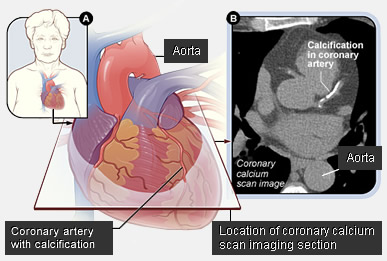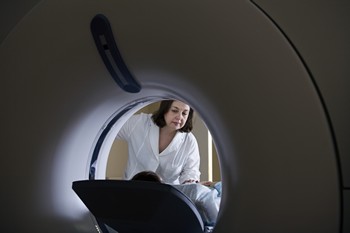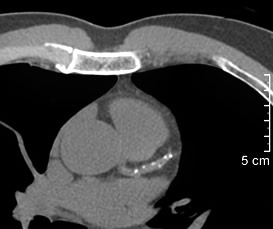Cardiac CT Calcium Scoring

Courtesy of the NIH National Heart, Blood & Lung Institute
Are you concerned about heart disease? A cardiac CT scan (also called a CAT scan) for coronary calcium is a non-invasive way of obtaining information about the presence, location and extent of calcified plaque in the coronary arteries – the vessels that supply oxygen-containing blood to the heart muscle. Calcified plaque results when there is a build-up of fat and other substances under the inner layer of the artery. This material can calcify, which signals the presence of atherosclerosis, a disease of the vessel wall that is also called coronary artery disease (CAD). People with this disease have an increased risk for heart attacks. In addition, over time, the progression of plaque build-up (CAD) can narrow the arteries or even close off blood flow to the heart. The result may be chest pain, sometimes called “angina,” or a heart attack.
Because calcium is a marker of CAD, the amount of calcium detected on a cardiac CT scan is a helpful prognostic tool. It measures the amount of plaque in the arteries, which is a leading indicator of heart disease. Knowing your score may help you monitor or even improve your disease. Your doctor may recommend lifestyle changes, such as medication and changing your diet and activity level that may result in an improvement in the amount of plaque in your arteries.
Why get Cardiac CT Calcium Scoring?
- Every 29 seconds, an American suffers a heart attack.
- Every 60 seconds, an American dies from a heart attack.
- 50% of men and 63% of women who die suddenly from a heart attack have no previous symptoms.
- Nearly 80% of people under age 65 who die of heart disease do so during their first heart attack.
 The statistics are sobering, and more than half the people who die suddenly from a heart attack have no previous symptoms. Cardiac CTs for calcium scoring are designed for people who have not been diagnosed with heart disease. Because calcifications are an early sign of CAD, these scans can show whether you're at risk for a heart attack or other heart problems before other signs and symptoms occur. Cardiac CTs for calcium scoring are 99 percent effective in confirming or ruling out coronary artery disease.
The statistics are sobering, and more than half the people who die suddenly from a heart attack have no previous symptoms. Cardiac CTs for calcium scoring are designed for people who have not been diagnosed with heart disease. Because calcifications are an early sign of CAD, these scans can show whether you're at risk for a heart attack or other heart problems before other signs and symptoms occur. Cardiac CTs for calcium scoring are 99 percent effective in confirming or ruling out coronary artery disease.
Are you at risk?
The following factors may increase your risk of heart disease.
- You are male and over 45 years of age.
- You are female and over 55 years of age, OR you have passed menopause or had your ovaries removed and are not taking estrogen.
- Your father or brother had a heart attack before age 55 OR your mother or your sister had one before the age of 65.
- You smoke OR you live/work with someone who smokes regularly.
- You have a total cholesterol level of 240 or higher.
- You have high blood pressure.
- You are 20 pounds or more overweight.
- You do NOT exercise at least three times a week.
- You have diabetes OR you need medicine to control your blood flow.
How should you prepare?
No special preparation is needed before a cardiac CT for calcium scoring. You should continue to take your usual medications, but try to avoid caffeine and smoking for four hours prior to the exam. No medicines or injections are required.
Please wear comfortable, loose-fitting clothing to your exam. You may be given a gown to wear during the procedure.
Women should always inform the CT technologist if there is any possibility that they are pregnant.
What is the exam like?
 The CT exam is painless, fast and easy. You just lie on your back on the CT table. Electrodes will be attached to your chest, so the EKG machine can record the electrical activity of the heart. This makes it possible to record CT scans when the heart is not actively contracting.
The CT exam is painless, fast and easy. You just lie on your back on the CT table. Electrodes will be attached to your chest, so the EKG machine can record the electrical activity of the heart. This makes it possible to record CT scans when the heart is not actively contracting.
Next, the table will move quickly through the scanner to determine the correct starting position for the scans. Then, the table will move slowly through the machine as the actual scanning is performed. You will be asked to hold your breath for 10-20 seconds while the images are recorded. The entire procedure is usually completed in less than 10 minutes.
You'll be able to return to your normal activities after the cardiac calcium scan is done.
Are there any risks involved in Cardiac CT Calcium Scoring?
A cardiac calcium scan has very few risks. The test isn't invasive, which means that no surgery is done and no instruments are inserted into your body. Unlike some CT scans, cardiac calcium scans don't require an injection of contrast dye to make your heart or arteries visible on X-ray images. These scans involve radiation, although the amount used is small — less radiation than you're exposed to during an airplane flight.
What will the test results show?
 You will be given a copy of your test results before leaving, and your family doctor will also be sent a copy of the results. You'll get a calcium score, also called an Agatston score, which is based on the amount of calcium found in your coronary (heart) arteries.
You will be given a copy of your test results before leaving, and your family doctor will also be sent a copy of the results. You'll get a calcium score, also called an Agatston score, which is based on the amount of calcium found in your coronary (heart) arteries.
A negative cardiac CT scan that shows no calcification within the coronary arteries suggests that atherosclerotic plaque is minimal and that the chance of coronary artery disease developing over the next two to five years is very low.
A positive test means that coronary artery disease is present, regardless of whether or not you are experiencing symptoms. The amount of calcification, which is expressed as a score, may help to predict the likelihood of a heart attack in the coming years.
| Calcium Score | Presence of Plaque |
|---|---|
| 0 | No evidence of plaque, retest in five years |
| 1-100 | Minimal evidence of plaque |
| 101-400 | Moderate evidence of plaque |
| 400 or higher | Extensive evidence of plaque |
| 1000 or higher | High risk, additional intervention is needed; see your doctor |
If your score indicates the risk or presence of heart disease, your doctor may recommend tests or medications or lifestyle changes to help slow the progression of the disease. Be sure to consult your healthcare provider for the proper treatment plan.
How can you keep your heart healthy?
- Don't smoke.
- Maintain healthy cholesterol and blood pressure levels.
- Maintain a healthy weight.
- Choose more heart-healthy foods.
- Get and stay active.
- Avoid stress or help reduce it by exercising.
- Know your family history.
- Learn the signs that something's wrong and report them to your healthcare provider.
![]() Cabell Huntington Hospital is the first and only Center of Excellence for the Society for Heart Attack Prevention and Eradication in West Virginia.
Cabell Huntington Hospital is the first and only Center of Excellence for the Society for Heart Attack Prevention and Eradication in West Virginia.
